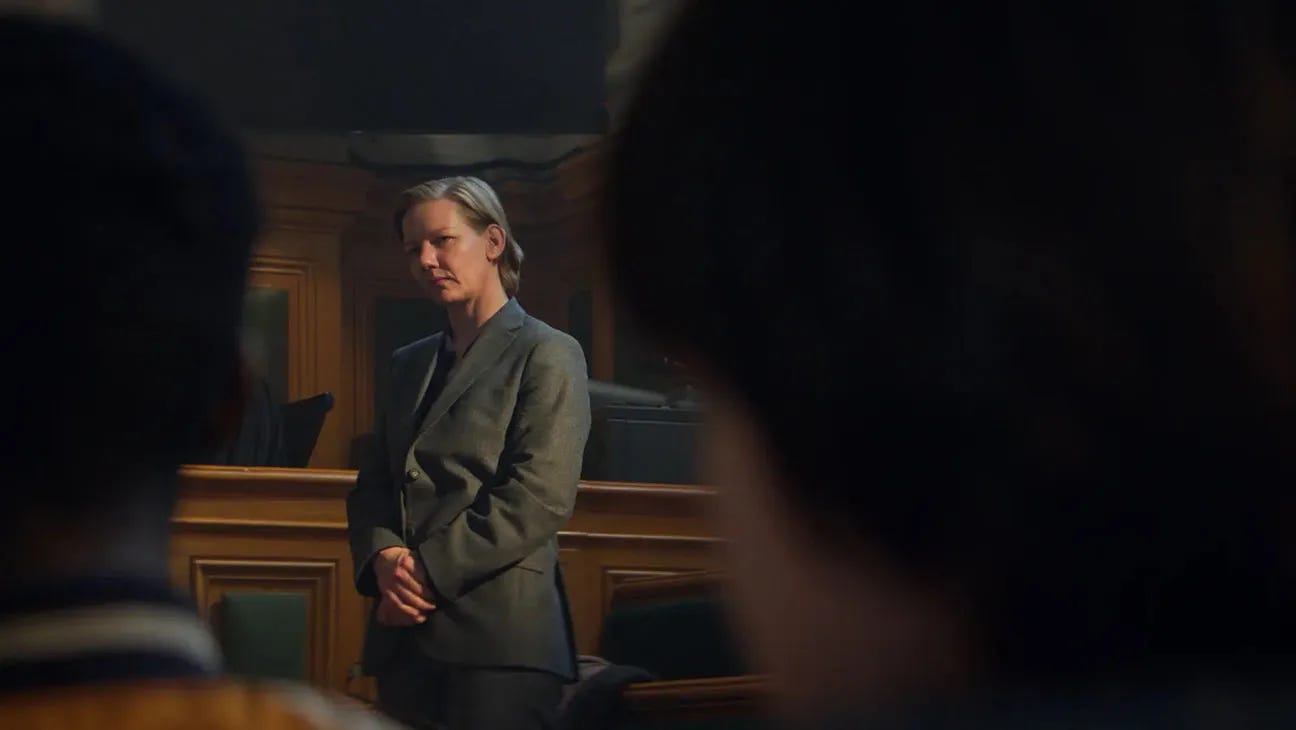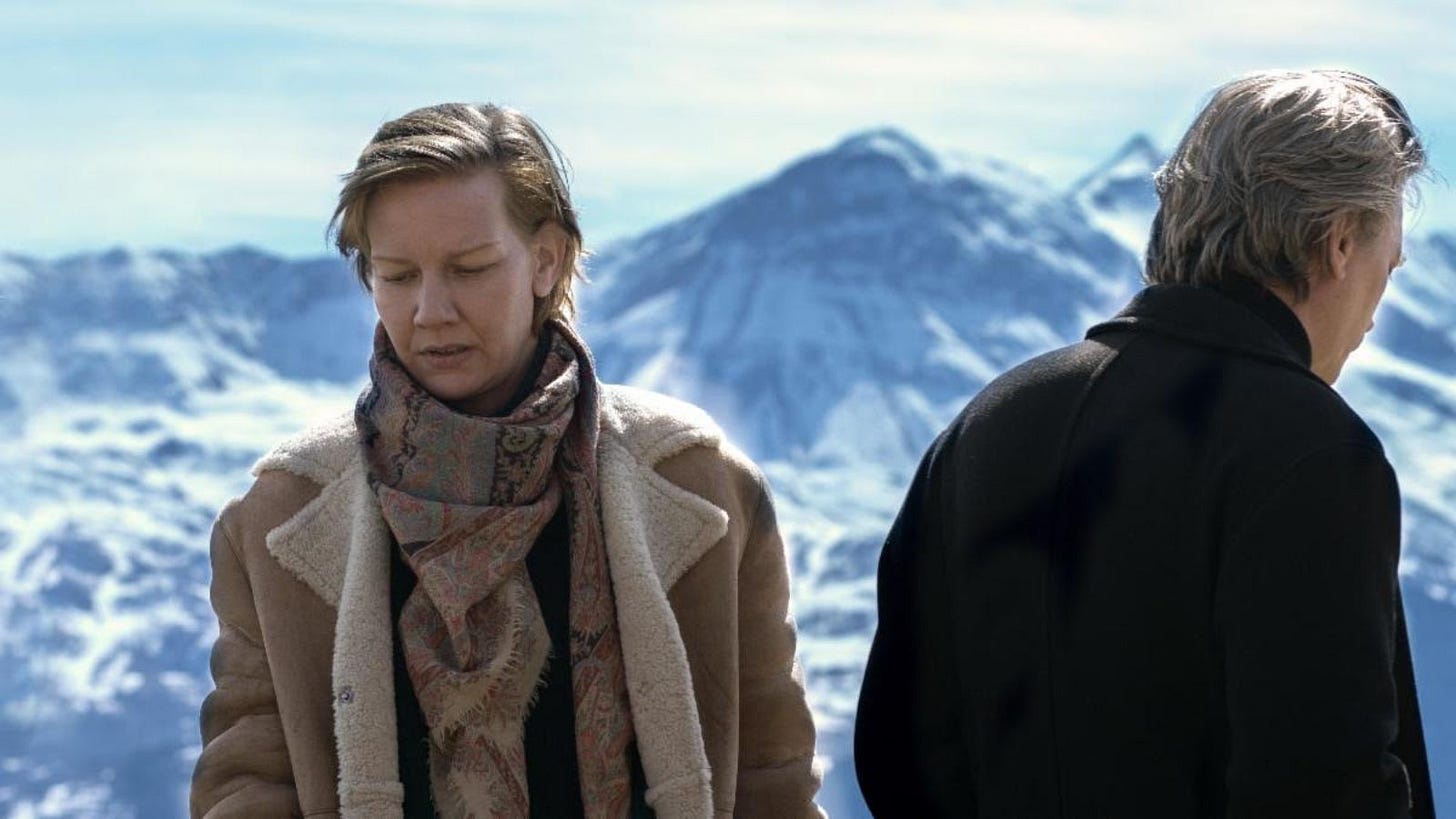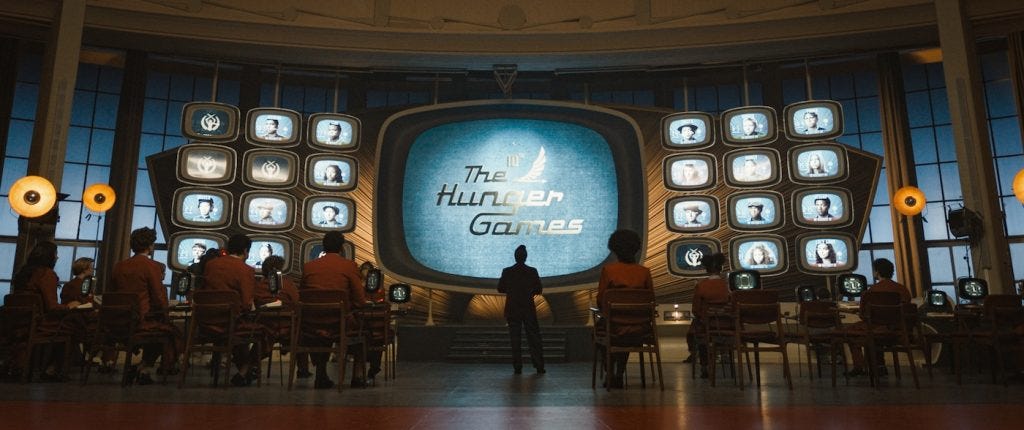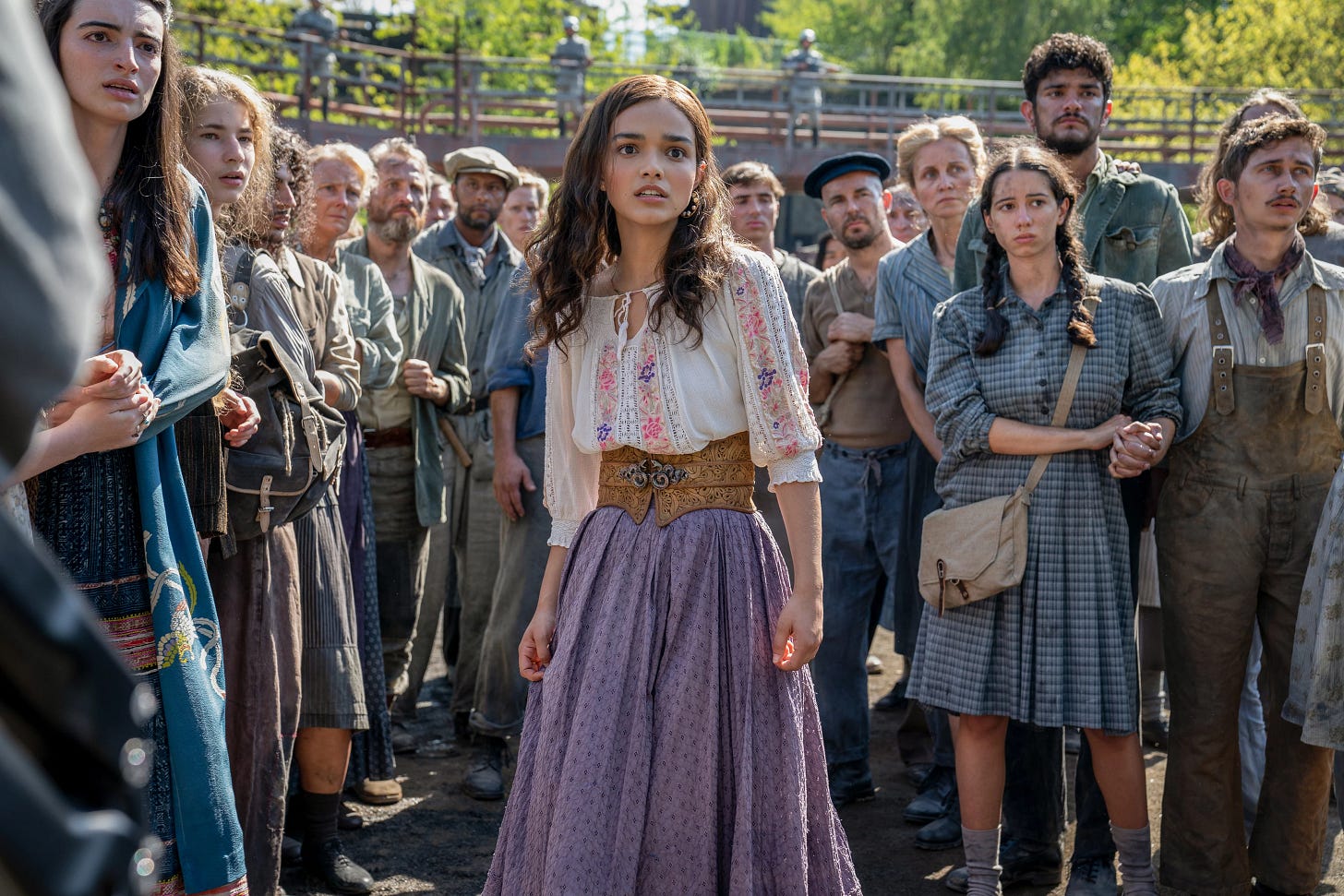Reviews - Anatomy of a Fall & The Hunger Games
Two films tried to get at the center of human nature through very different means and different results. From marriages and courtrooms to fictional worlds and arenas, both leave a lot to think about.
This week I’ll review two films that have been at the center of the Twitter discourse. First, Justine Triet’s Palme D’Or winning Anatomy of a Fall, which I can confirm is (for now) one of the best films of 2023 and an effective examination of the nature of human relationships while critiquing the legal system and its rigidities. NEON is currently trying to give it a push for the Oscars, I hope it succeeds, but regardless if you have a chance to watch it, please do.
The second review is for Francis Lawrence’s The Hunger Games: The Ballad of Songbirds and Snakes. This one also had a lot to say and is one of the more interesting blockbuster IP films released this year. It may not be my favorite, but I appreciate what it was going for, especially when most other IP films were playing it so safe like the lifeless MCU films released this year (yes, including Guardians of the Galaxy Vol. 3).
Both reviews are relatively spoiler free, I hope you get motivated to watch them after reading them if you haven’t yet.
Is It Possible to Find Truth?: Justine Triet’s Anatomy of a Fall
Production from France. Released in 2023.
From the last twenty years, there is no doubt that Maren Ade’s Toni Erdmann stands as one of the very best offerings of European cinema and film in general. Part of its charm is in its meticulous and farcical take on white collar jobs, European high corporate society and a post-modern sense of unhappiness and unfulfillment. The inciting power behind that farce is in Ade’s script and mainly through the late Peter Simonischek’s performance as the father Winifried. However, the film gets its beating heart, emotional complexity and depth of despair hidden behind the comedy through Sandra Hüller as Ines, who sings, strips, yells, cries and a lot more in a performance that I can only describe as multi-faceted and committed.
Performance in film is something most see but take for granted, and it is easy to see why. It is easy to appreciate music, the beauty of a set, the composition of a shot or the fluidity of an edit, while understanding why we make those points or appreciations. With acting, it is mostly a matter of impact, and often we find contradictory statements of appreciation, some value realism, some value powerful moments, others value quiet interiority. Although I feel far from understanding the entirety of a good performance, and the complexity it takes to pull it off smoothly, there is something quite grand to what Sandra Hüller manages to achieve with her acting. In Toni Erdmann, she is both loud and quiet, fierce and scared, dismissive but needy, and so many other things. This of course brings a lot of impact into her work, although it is not its main virtue. It is more to confuse, to question, to feel empathy… in essence to feel human.
This year, Hüller once again gave a magnificent performance through Anatomy of a Fall which, like in Toni Erdmann, takes full advantage of her acting capabilities in a very strong committed and multi-faceted performance to make us question everything surrounding a marriage, try to find the truth through the systems placed by the law to do so, and realize that, in the end, those systems were never equipped to grapple with the truth, because it is composed of humans, who are similarly unable to bridge that gap. Hüller stars as Sandra Voyter, a German writer living with her husband and blind son in Grenoble, France when one day her husband falls from the attic of his chalet to his death, leaving her son, the police and the viewers to make that simple question used in the film’s advertising: did she do it?
That question is important but at the same time it is not. It tricks us into trying to find answers through clear proof where we are unlikely to get any, but director Justine Triet uses it to full effect to make the viewer concentrate on every movement, every choice, every signal made by Hüller as she interprets Voyter as many things: stern, selfish, caring, controlled, loud, charming and candid. When she takes off her jacket, it signals she is getting annoyed; she clarifies information that does not necessarily help her, but the viewer doubts if she is sincere or just looking for empathy; she lies but for similar reasons many would lie in similar circumstances; she constantly glances at her son to get approval from him, letting out with the slightest of looks some sort of vulnerability. Everything she does makes her seem one way or the other, but without a scene from the start to let us know whether she is a murderer, our examination and empathy turn into an intellectual exercise of its futility.
Sandra is at the center of the film, but there is an argument to be made that her blind son Daniel, played by Milo Machado-Graner, has equal footing as the film’s focus, and brings a more naive energy to the ambiguity that Triet sets the stage for in 150 minutes. He may be an insert for the viewer, who wants to understand the situation and find inner peace in a scenario where both options are equally impossible to console. During the trial, he is poised, reserved, until he isn’t where he breaks down like Setsuko Hara would in Yasujiro Ozu’s films, that provides the falling action necessary for the film to reach its conclusion and maybe one of its central themes. Similarly, Sandra’s husband, played by Samuel Theis, brings a contradictory energy to the film’s perspective in a small, combative role that serves to the benefit both him and Hüller, much like Warren Beatty and Diane Keaton fed off of each other’s madness in Reds, another film equally indebted to the magic and power of performance.
Even though acting is central to this film, it is far from what makes it better than most films I have seen this year. Director Triet creates tension around her writing and editing to throw the viewers off balance. Every choice during the first half of the film gears us towards an experience grounded in reality, where conversations seem very real, the viewer’s perspective is limited, investigations happen with a matter-of-factness uncommon in procedurals. Then, certain moments occur with an almost faded background courtesy of maybe the photography or editing, where viewers are not sure if they are watching a memory, an interpretation of an event, or something that actually happened within the world of the story. And when these sequences signal that maybe someone is getting closer to an answer, Triet says: no. She cuts back to the courtroom, and lets the rest happen without letting the viewer get a semblance of truth.
That is what, maybe, Triet tried to achieve with Anatomy of a Fall. Much like Noah Baumbach’s Marriage Story, it is clear that the courtroom is not the best place to grasp the nuances of an adult relationship, especially those moments of ire and high tension that are usually just small parts of a dynamic that exist within most couples but none choose to show to the world. The problem with the legal system in both films is that courts are based upon the finding of truth, or an objective interpretation of the events that leads the system to make decisions accordingly. What if that is impossible to achieve? If the truth people are trying to grasp is the nature of a human relationship, can one objective truth even exist? What can happen when two people have completely different interpretations of events that contrast each other? If both are being honest with themselves, but the facts they state are contradictory, how can a judge or a jury interpret that information? How can we, as viewers, make a choice surrounding such a complicated dynamic of which we only get to see a small part of?
Triet manages to ask these questions deftly through the court’s actions, through Sandra, through Daniel and through Samuel. All have things to say in their own times, and in the end, it is not a question of what is the truth, but rather what truth can we live with? Ultimately, Sandra and Samuel had a marriage that was complicated, and that is all that anyone can say about it. No document, recording, witness, or expert report can factually make a finding of the ‘core’ of an interaction, a liaison, a partnership. What we can do, as Daniel must do, is decide how we feel about it. Anatomy of a Fall may be one of the year’s best films, not just because of Sandra Hüller, the rest of the case and its technical prowess, but also in how it uses these elements coherently to confuse, question, have empathy, and feel human.
Bloated Human Interest Thesis: Francis Lawrence’s The Hunger Games: The Ballad of Songbirds and Snakes
Production from the United States. Released in 2023.
The villain origin story is a trope used by many franchise filmmakers to milk more out of a story and find more depth where there maybe shouldn’t be any. Couple that with the therapy-core scripts that dig for nuance without using the right tools, and you’ve got a current trend of films that are meh at best and actively bad at worst. I’ve already talked about Ti West’s Pearl, which seemed to mine for her origin as a psychopath but also without letting her have any character development? (so weird). And then we have Todd Phillips’s Joker, which took inspiration from two of Scorsese’s best films The King of Comedy and Taxi Driver, but misunderstood the intent behind those works, choosing to highlight societal commentary while letting its protagonist off the hook (something Scorsese never did in these two films).
While The Ballad of Songbirds and Snakes makes interesting use of the trope by contrasting the protagonist with other characters faced with similar moral dilemmas, it ultimately yields a mixed result due to it being a bloated story with a lack of focus, a lack of a clear point of view, and a rushed story that cut corners to make up for a long runtime. The good parts are really good, for example the sequence of shots cut to look like one take following Lucy Gray at the start of the Hunger Games, the music -give me Rachel Zegler singing folk music any day-, and many of the performances, including Tom Blyth and Rachel Zegler as the leads, but especially Josh Rivera as the conflicted, naive and soulful Sejanus and Viola Davis being erratic and having the time of her life as Volumnia Gaul. The bad parts, I’d say, are in essence the script and its adaptation (even though I have not read the book).
The film is divided in three distinct parts, the first two of which tread familiar ground through the perspective of someone within the Capitol: tributes get reaped from each district, they come up with strategies, bond with other people and eventually fight to the death until one victor remains in the games. This seems simple enough and Lawrence with the experience he had with Catching Fire, knew how to use the right tools to make these parts effective. Some dialogue felt corny or forced, which took me out of it, but in general had the beats it needed. The problem was that the emotional core of the film was in the third act that was fresh and free flowing, but so rushed that no moment felt earned, especially the climax of the film which simplified Blyth’s Snow to a caricature of an incel when in fact the motivation behind his character is so much richer in the text.
One of the main problems in that respect is that Snow does not get a clear point of view. This film suffered a very similar problem as the first Hunger Games film, where it lacked Katniss’s POV, everything felt naturalistic but at the cost of any psychology. Here, the film needed the psychology to track Snow’s moral downfall, but without any action leading him to change -rather, with everything seeming like a catalyst rather than a cause-, he seems similar to the titular character in Pearl, where he just does bad things and becomes increasingly pragmatic about it. The contrast of Snow with Sejanus is good because it drives home the point that Snow is evil not because of his circumstances but because of an active choice. However, by removing any inciting cause to take him in that downward spiral, the journey loses any sense of excitement. Maybe the book had a lot more to say regarding this point and his mental map was clear-cut, but sadly, it never translated into the big screen.
The question at the center of The Ballad of Songbirds and Snakes is made by Gaul during the film’s first act: What are the Hunger Games for? She sees the arena as a microcosm of human nature in a world where scarcity leads many to fight for resources and survival, leading everyone to do bad things. More to the point, it asks questions regarding the opposing views on human nature: is evil natural or forced? Can people choose to be good or is it only an option available to the privileged? They are ultimately very interesting questions to examine, and I see why Suzanne Collins wrote this story asking herself those questions in recent years. Even though some elements within the story led to that interesting examination, the tropes of the villain origin story prevented it from going deeper into them to discover a worthwhile idea to think about.
The best villain origin story by far is Francis Ford Coppola’s The Godfather Part II. By looking at two stories at the same time and examining their decisions and looking at both characters' values and lack thereof, it reflected both the deterioration of American values in a new generation while condemning a romanization of past times where injustices and immoralities still existed. Lawrence tries his best to condense a whole book into 260 minutes and drive home the villain origin through contrast, but because of the bloated-ness of the story, the lack of focus on Snow’s interiority and a rushed third act, it struggled to do so.










